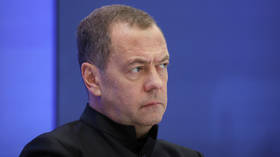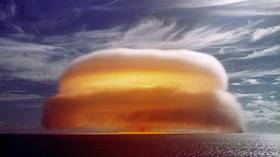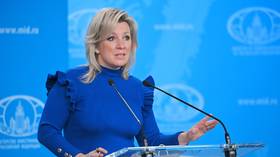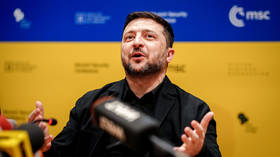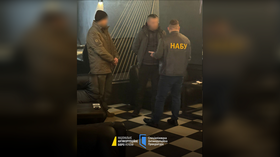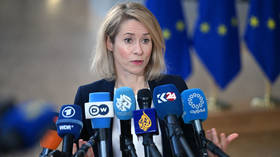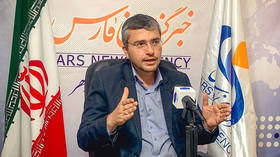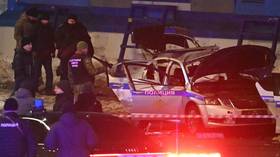US facing intelligence ‘black hole’ over Ukraine events
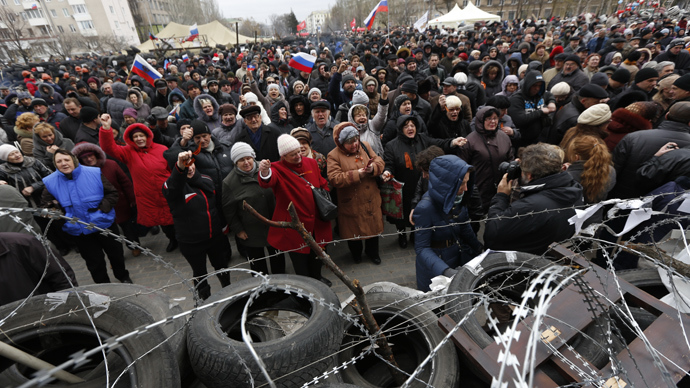
The United States is facing an intelligence ‘black hole’ over what is happening in Ukraine in the last few month, and not feeling able to judge the events clearly resort to shrill response and rhetoric, Oxford University historian Mark Almond told RT.
RT:People in Slavyansk are bracing for a larger-scale offensive – Kiev has pledged a harsh crackdown ... just how violent could it get?
Mark Almond: Well, it could get very violent. But I think part of what is a little bit surprising is that the Ministry of Interior talks about sending in special forces, presumably, highly trained commandos. Yet what we seem to be seeing is a rather ramshackle operation on the edge of Slavyansk, by the people, who might be called paramilitary militias. Certainly, people who don’t seem to have the high level of training or commitment that we would expect from somebody who wanted to move in quickly and decisively to crush what they see as a rebellion.
So, the danger is at one level that we are going to see sporadic fighting rather than some decisive action. And that might seem to less worrying. But on the other hand, it does suggest that you could have a drip of casualties through the night and, of course, the radicalization, which we see going on both in south-eastern Ukraine, but also in other places where Ukrainian nationalists are being aroused by arguments that their country is about to be dissected.
RT:Anti-government activists say they're being attacked by fighters from the Right Sector – how much of this is true?
MA: Well, I think we’ve certainly heard the rhetoric from the Right Sector. But also after all, the new government in Kiev announced setting up a National Guard precisely in order to incorporate the paramilitary fighters of the Right Sector into something that would look more like a state organization.
And, given the failure of the local police in the south-east of Ukraine to assert the authority of the new regime in Kiev, they really do need – if you like – committed activists. And those are more likely to come, actually, from outside the old security forces. We’ve seen, for instance, the dismissal of large numbers – tens of thousands – of policemen in Berkut members for supporting or maintaining the government stance under Yanukovich. Those people, I suspect are providing at least some of the activists in the south-east.
The new regime in Kiev is rather short of trained and competent personnel. And at the same time it has an incentive to move the radical right-wing militias out of Kiev, sending them somewhere, where – if they’re successful the new government can get the credit, if they get a bloody nose from confrontation with the people in south-east Ukraine it will, in fact, weaken them vis-à-vis the other side of the new regime, which came to power on the back – if you like – of that violence in February, but isn’t entirely comfortable with it.
RT:From the beginning of the popular uprising in the east people there have been saying they fear the neo-Nazis – and Kiev and Western states have been saying there is no threat from extremists. Will they be able to ignore these concerns now?
MA: If even a week ago the new regime in Kiev had said: ‘Why don’t we hold a referendum simultaneously with the presidential election that’s scheduled for May 21. Why don’t we offer a pallet of reforms.’ Maybe they could’ve calmed the fears.
But what they’ve tended to say: ‘We’re listening to you, but anybody, who you chose as your spokesman is a Russian agent, an agent of foreign power, an imperialist threat.’ So, there isn’t really any dialogue.

And we saw that on Friday when Yatsenyuk, the interim prime minister, came to Donetsk. He basically spoke to a haul of his own supporters and local oligarchs, rather than trying to address the local people – at least, those people, who are demonstrating against his government. And I think this is the great problem. It’s a dialogue of the deaf, at best.
RT:How much attention will these events get in the Western media?
MA: Well, what is, I think, quite striking is that there are several journalists from Western media outlets in Slavyansk and they all contradict the official line from Kiev. They say there isn’t an actual operation in town. There’s some kind of a disturbance; there’s been some kind of shooting on the edge of the town. But nothing that one could call a serious military or commando operation.
And even journalists, who in the past have been rather sympathetic to their point of view, having to say that they don’t find information they’re getting from the official sources in Kiev matching what they are themselves seeing in Slavyansk and other parts of south-east Ukraine.
RT:John Kerry has – in a phone conversation with Foreign Minister Lavrov – once again pointed the finger at Russia. How long is this blame game likely to go on?
MA: Well, I think it’s quite blame game. One problem for the Americans is that they’re really boxing in the dark. They didn’t expect what would happen in Crimea to happen. They don’t really know what’s happening in south-east Ukraine. They don’t really know what’s happening in Russia itself.
In a sense, they’re now steering up a great deal of anxiety partly is a sense to cover themselves from some worst case scenario, from that point of view. I think the danger from the point of view of NATO and the Americans is really… They seem to be facing a kind of intelligence ‘black hole’ for the last few months over Ukraine and over what’s happening there. And I think this is really something that bewildering them. Leading to more shrill response because they don’t really feel able to judge the events clearly and to know what’s going to happen next.
The statements, views and opinions expressed in this column are solely those of the author and do not necessarily represent those of RT.
The statements, views and opinions expressed in this column are solely those of the author and do not necessarily represent those of RT.


